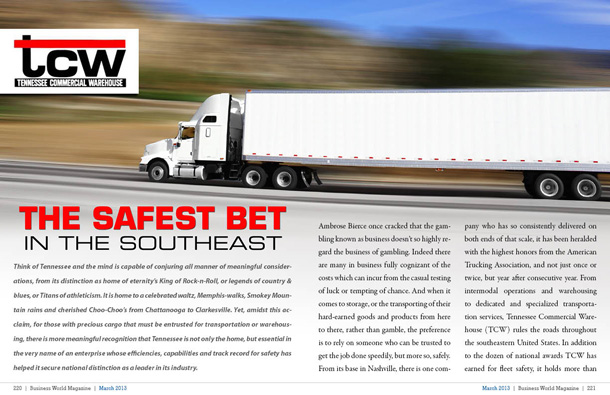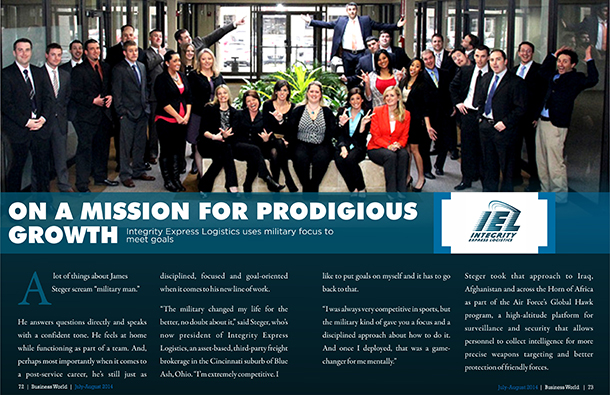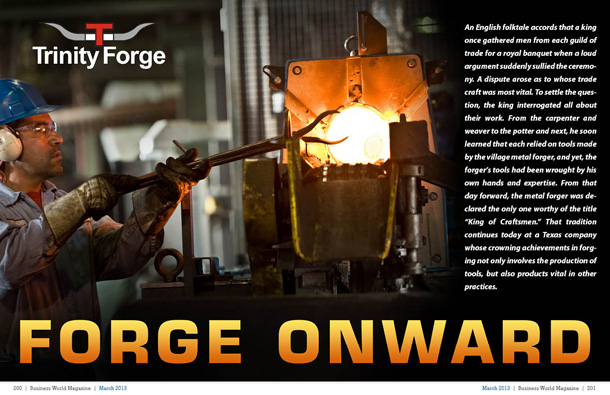
The Safest Bet in the Southeast.

Think of Tennessee and the mind is capable of conjuring all manner of meaningful considerations, from its distinction as home of eternity’s King of Rock-n-Roll, or legends of country & blues, or Titans of athleticism. It is home to a celebrated waltz, Memphis-walks, Smokey Mountain rains and cherished Choo-Choo’s from Chattanooga to Clarkesville. Yet, amidst this acclaim, for those with precious cargo that must be entrusted for transportation or warehousing, there is more meaningful recognition that Tennessee is not only the home, but essential in the very name of an enterprise whose efficiencies, capabilities and track record for safety has helped it secure national distinction as a leader in its industry.
Ambrose Bierce once cracked that the gambling known as business doesn’t so highly regard the business of gambling. Indeed there are many in business fully cognizant of the costs which can incur from the casual testing of luck or tempting of chance. And when it comes to storage, or the transporting of their hard-earned goods and products from here to there, rather than gamble, the preference is to rely on someone who can be trusted to get the job done speedily, but more so, safely. From its base in Nashville, there is one company who has so consistently delivered on both ends of that scale, it has been heralded with the highest honors from the American Trucking Association, and not just once or twice, but year after consecutive year. From intermodal operations and warehousing to dedicated and specialized transportation services, Tennessee Commercial Warehouse (TCW) rules the roads throughout the southeastern United States. In addition to the dozen of national awards TCW has earned for fleet safety, it holds more than two dozen State-recognized safety honors which encompass North & South Carolina, Georgia, Alabama, Mississippi as well as its home state of Tennessee. In fact, one of the company’s longest serving drivers recently secured national honors from the National Safety Council. Robert Oldham, a driver employed by TCW since 1967, has logged more than four million miles over his years on the road, yet has NEVER had an accident, nor received a ticket nor traffic citation of any kind.
“Safety is one of our core values,†says TCW President Dave Manning. “Safety takes precedence over every operational aspect of our company, and we’re very proud of how we’ve been able to accomplish our record for safety.â€
Of course, the company has plenty else that it can also be proud of, from its more than 60 years of successful operation to the wide-ranging reliance on their services from major national and international companies whom TCW considers as partners. The creating (and maintaining) of such relationships has helped TCW evolve operational capabilities, expand their number of terminal locations and efficiently, if not increasingly, cater to varied interests of industry. And be sure, TCW offers benefits beyond its stellar standards for safety.
To account of those benefits and detail the effort to which TCW has gone to provide value to its clients, it is necessary to recognize a family who has been the driving-force guiding TCW’s growth since its inception in 1948.
By George, He’s Done It!
TCW Vice President of Marketing Gary Duffel provides historical background explaining that TCW was initially spurred to life through the hard work of Howard George. Establishing the company in 1948, Howard spent his initial years primarily serving the hauling needs of producers in the tobacco industry. Over time, Howard’s son (Phil George) was appointed to lead the company and through his guidance, like so much of those tobacco crops, business blossomed. Duffel credits the growth to Phil George’s philosophies on customer service, employee relationships and certain professional prowess in devising a business model complemented by diversification. TCW expanded service offerings with warehousing, intermodal operations and the transport of more varied goods, which included highly-sensitive communication equipment.
Dave Manning says Phil George’s approach also heavy relied on having the right assets in place, assets controlled by the company, which meant owning their own buildings and their own equipment. He also recognized that having the right staff was critical to capturing the right customers. His vision was to create a workplace where employees not only sensed, but genuinely knew they were valued. As Manning explains, he implemented profit-sharing plans, life insurance, health insurance, 401k plans and constantly drove home the message that TCW would provide the opportunity to work out their career in an environment that more than satisfied all of their expectations.
Phil George died in 2003, but the same values, principles and professional acumen that he imparted to TCW has been fully embraced and embodied in TCW’s present Chief Executive Officer, Scott George, who is very much his father’s son. Gary Duffel describes Scott as “the hardest working man in the company†and says his approach to the job isn’t viewed so much in terms of career, but something more akin to “an obligated†commitment to the people who work there and commitment to the customers they serve.
Commitment is a key component of TCW and it can be measured both in terms of employee longevity as well as the decades of service they’ve maintained with clients that includes Nissan, Firestone, other JIT manufactuers, and numerous others. And though the company has evolved over the years by branching into new service segments and taking on new client relationship, it still continues to provide the services to the tobacco industry which got their wheels rolling so many years ago.
Operational Excellence
One of the fundamental factors contributing to TCW’s success is its ability to efficiently respond to a variety of needs. While some of its competitors may focus on one aspect of service, TCW invokes the full measure of its assets to provide a range of solutions that encompass all aspects of consolidation & distribution, warehousing, intermodal operations, dedicated transportation and highly specialized transport when the cargo situation calls for it.
In wanting to provide the best range of service to its customers, Dave Manning says the company has constantly invested in the best equipment and technology services which collectively empower TCW with capabilities so few companies can boast.
For example, TCW’s more than 20-year long relationship with Peterbilt, under the direction of Scott George, has led to the customization of tractors that have been weighted lighter to accommodate for heavy loads, thereby offering improved fuel efficiency and cost savings that pass to the customer.
TCW has additionally invested in the most sophisticated, state-of-the art technological systems which give them uncanny ability to rapidly communicate with drivers, access all manner of detail about cargo condition, location and arrival time, and what’s more, the ability to assess every operational nuance of the transport process. That technology actually analyzes driver performance, noting speed, turns, lane shifting, time spent driving, and when all data is gathered and assimilated, TCW administration studies results to determine areas where drivers may need additional training, or encouragement to perform better. Again, safety is not something the company merely mentions; it is an uncompromising mandate.
To further that focus, TCW has invested in other technology that rapidly warns the driver when road conditions or operational aspects need to be adjusted for greater safety. Trucks additionally have lane departure alarms, anti-rollover technology that, on its own accord, will automatically take corrective action by decelerating brakes and aligning wheels when a situation may call for it. These are more than trucks – they’re highly sophisticated, computerized mechanisms of mobility. As Dave Manning says, “Investing in that technology pays off by having far fewer accidents… that protects our drivers, but it also helps protect our customers too.â€
Yet as Duffel explains, for all the technology and specialized equipment utilized to serve specialized cargo requirements, the business still comes down to people serving people. Duffel says the team at TCW goes into negotiations with clients by first learning exactly what their needs are. From there, TCW intently focuses on how best to provide value to that customer. “Our goal is to create a win win relationship which is beneficial for our company and the customer we’re serving, in such a way that is so easy and so cost-effective they wouldn’t want to do business anywhere else,†says Duffel.
At present, TCW has ten terminals located throughout the southeast. In the coming year, the company anticipates building a new and larger facility in Savannah and strong growth at it’s other terminals including the other port terminal of Charleston. TCW further anticipates growth by opening new locations which may include New Orleans, Mobile, and Norfolk.
Manning says TCW will continue to dedicate itself to opportunities in the southeast and build upon the synergies it has established through its varied terminal locations. He also emphasizes continued focus on the five core values which have been the foundation for all of TCW’s successful functionality: creating value to customers; investing in assets; operating innovatively; satisfying employees; and adhering to the most stringent protocols of safety.
 Through focusing on such values, TCW can be expected to further rein as the southeast’s safest, and most sensational, ruler of the road.








